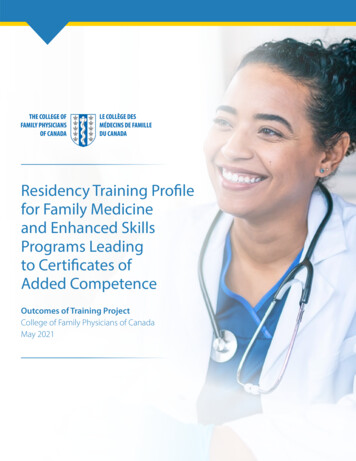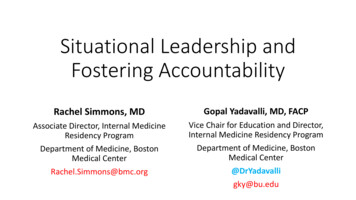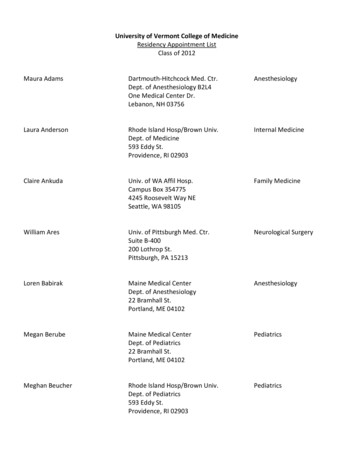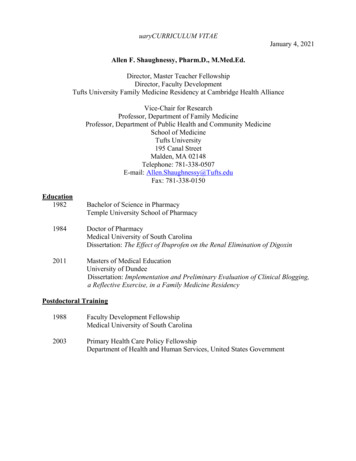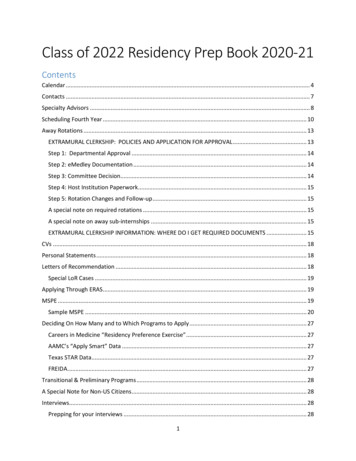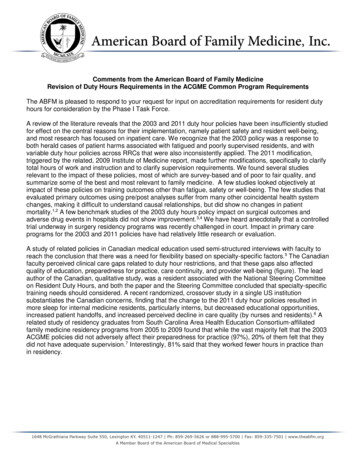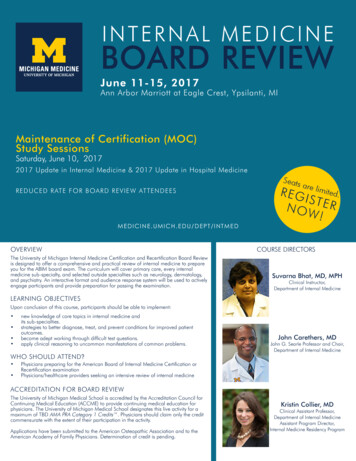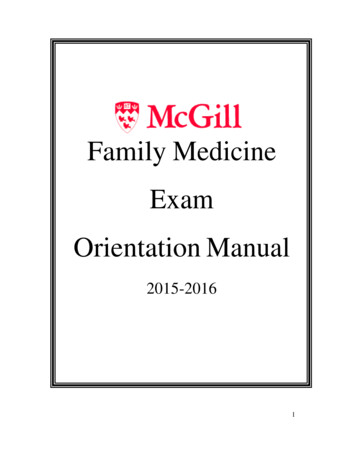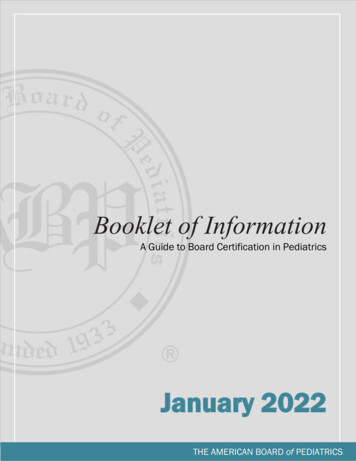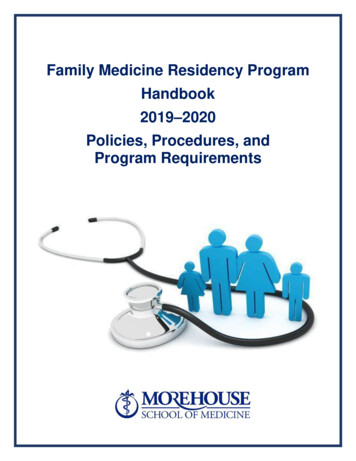
Transcription
Family Medicine Residency ProgramHandbook2019–2020Policies, Procedures, andProgram Requirements
Table of ContentsPreface . 3Morehouse School of Medicine (MSM) Vision and Mission. 3MSM Vision. 3MSM Mission . 3MSM Graduate Medical Education (GME) Goals and Objectives. 3The MSM Family Medicine Residency Program . 3History. 3Mission. 4Training Goals . 5Program Contact, Administration, Faculty & Clinical Staff Information . 5Residency Program Location Contact Information . 5Program Administration and Leadership . 5Program Faculty and Clinical Staff . 7Clinical Faculty . 7Non-Clinical Faculty . 8Clinical Staff . 8Program Elements . 11Morning Report . 11Conferences/Didactic Sessions . 11Continuity Clinic . 12Scholarly Activity . 12Benefits . 12Continuing Medical Education (CME)/Book Allowance. 12Professional Organizations . 13Vacation/Sick/CME Leave . 13Rotation Contact Information. 14General Information for Faculty Members . 18Appendix. 20APPENDIX A: Moonlighting Form . 20APPENDIX B: Hand-off Form . 20APPENDIX C: Acknowledgement of Promotion and PGY2-Specific Requirements. 20APPENDIX D: Acknowledgement of Promotion and PGY3-Specific Requirements . 20Page 1
APPENDIX E: Evaluation of Faculty by Residency Program Form . 20APPENDIX F: Resident Leave Request Form . 20APPENDIX G: Inpatient Survival Guide . 20APPENDIX H: A Survival Guide for the Intern. 20Page 2
PrefaceMorehouse School of Medicine (MSM) Vision and MissionMSM VisionLeading the creation and advancement of health equity by: Translating discovery into health equity Building bridges between healthcare and health Preparing future health learners and leadersMSM MissionWe exist to: Improve the health and wellbeing of individuals and communities; Increase the diversity of the health professional and scientific workforce; Address primary health care needs through programs in education research and service withemphasis on people of color and the underserved urban and rural populations in Georgia,the nation, and the world.MSM Graduate Medical Education (GME) Goals and ObjectivesGME is an integral part of the Morehouse School of Medicine medical education continuum. Residencyis an essential dimension of the transformation of the medical school graduate into the independentpractitioner along the continuum of medical education. It is physically, emotionally, and intellectuallydemanding, and requires longitudinally concentrated effort on the part of the resident.Residency education at MSM has the following five goals and objectives for residents: To obtain the clinical knowledge, competencies, and skills required for the effectivetreatment and management of patients; To prepare for licensure and specialty certification; To obtain the skills to become fully active participants within the United States healthcaresystem; To provide teaching and mentoring of MSM medical students and residents; To directly support the school’s mission of providing service and support to disadvantagedcommunities.The MSM Family Medicine Residency ProgramHistoryThe MSM Family Medicine Residency Program is located in metropolitan Atlanta, Georgia, a city which isan economic and cultural center for not only the southeastern United States, but also the world at large.Morehouse School of Medicine opened in September 1975 as part of Morehouse College, with Dr. HughGloster as President and Dr. Louis Sullivan as Dean of the medical school. The Department of FamilyMedicine, the first clinical department, was established in July 1979. In 1981, the Department startedthe school’s first residency program. The department has been an integral part of the development ofthe school and is a critical link in the school’s educational programs. The residency program serves asignificant role in Georgia as a producer of family physicians who practice among underservedpopulations with more than 60% of its graduates remaining in the state after training. The program isaccredited by the Accreditation Council for Graduate Medical Education (ACGME).Page 3
Our program aims to be the best and most effective program in the southeast in developing superbfamily physicians for practice in underserved communities. We offer training in all aspects of familymedicine including but not limited to office procedures, community outreach, preventive medicine, andwomen’s health care. In our 38-year history, we have successfully recruited well-qualified graduates ofaccredited medical schools. To date, there are a total of 177 graduates from our program, many ofwhom have received recognition at the state and national level for their outstanding contributions. Afull complement of the brightest, most competent and compassionate students from around the nationand abroad join our residency training program.The Morehouse Family Medicine Practice, the Morehouse Healthcare Comprehensive Family HealthcareCenter, is a model office that provides a setting that fosters educational excellence, provides researchopportunities, and exposes residents to ambulatory office operations. Our faculty is a group of highlytrained, dedicated, and enthusiastic teachers who are effective in motivating their learners. They areinvolved in regular scholarly activities and are committed to maintaining excellence in education.MissionThe mission of the Morehouse School of Medicine’s Family Medicine Residency is to: Train residents to become excellent family physicians who care for underserved populations; Provide training in behavioral medicine and family dynamics to foster the physician’s awarenessof the importance of the family unit in treating the patient; Provide physicians training experiences in both inpatient and outpatient care; and Provide residents with basic skills necessary to implement preventive care and to consistentlyeducate patients about health and wellness.Morehouse Family Medicine Residency is a community-based residency program that is affiliated withAtlanta Medical Center, Atlanta Veterans Affairs, Children’s Healthcare of Atlanta, and Grady MemorialHospital. The residency program director, Riba Kelsey-Harris, MD, is responsible for all resident-relatedpolicies and procedures. Overall residency program administration policy development is a sharedresponsibility of our Program administration and the Program Evaluation. Key administrative andcurricular components of the program are developed by assigned faculty or clinical andadministrative/support staff with oversight from the program director (PD) and Program EvaluationCommittee (PEC).The business operation of the CFHC is the responsibility of the senior department administrator, Mrs.Jamie Baker. The operation of the clinical area is the responsibility of the medical director, MichelleNichols, MD. The Residency Program administrative staff oversees many of the administrative tasksrelated to residents.Hospital affiliates include: Grady Memorial Hospital (GMH) Children’s Healthcare of Atlanta (CHOA) Atlanta Veteran’s Affairs Hospital (VA) Atlanta Medical Center Main and South (AMC)Residents in our program also obtain education from a number of physicians in the private and publicsectors for outpatient rotations.Page 4
Training GoalsThe MSM Family Medicine Residency Program goals are listed below: Provide the Family Practice resident with the knowledge, skills, and attitudes tocompetently manage medical patients with simple and complex problems. Provide a foundation which can be expanded and refined during medical subspecialtyrotations. Provide the resident with knowledge about how family dynamics and behavioral medicineprinciples apply to the hospitalized medical patient. Teach the resident to utilize the concept of the “healthcare team” whereby the physician isthe coordinator of the health team’s efforts, calling upon support and input from personnelin nursing, social work specialty clinics, nutrition, administration, and chaplain staff. Teach the resident to recognize the limits of one’s own knowledge and skills and institutetimely and appropriate consultation. Teach the resident to exhibit patterns of inter-professional collaboration and cooperationwhich enhance patient care. Teach the resident to recognize that hospital care is merely one phase on a continuum oflongitudinal and continuous medical care. Train family physicians to provide comprehensive, continuing care to all of their patients. Stimulate the analytical attitude toward the most efficient and effective use of thephysician’s time, personnel, and facilities in order to provide optimal care to patients. Implement preventive services and consistently educate patients about health. Train Family Medicine residents in the six core competencies, as identified by the ACGME:o Patient care and Procedure Skillso Medical knowledgeo Practice-based learning and Improvemento Interpersonal and Communication Skillso Professionalismo Systems-based PracticeProgram Contact, Administration, Faculty & Clinical Staff InformationResidency Program Location Contact InformationThe Morehouse School of Medicine Family Medicine Program is physically located in East Point, GA. Ourcontact address is 720 Westview Drive, SW, Atlanta, GA 30310. Our phone number is 404-756-1230.Further information in relation can be found on our website ram/index.php.Program Administration and LeadershipProgram Director – Dr. Riba Kelsey-HarrisThe program director provides the overall leadership, development, and implementation of theresidency program. The program director ensures that the program is compliant with all AccreditationCouncil for Graduate Medical Education (ACGME) requirements for a family medicine residency trainingprogram. The program director is responsible for residents’ progression and matriculation from theprogram and for the information that is communicated to residents, mainly via semi-annual residentevaluations. The program director tracks and reviews all resident evaluations, procedure and patientlogs, and duty hours to ensure overall resident and program compliance.Page 5
Other responsibilities include: Oversight of all aspects of the residency program and resident education Creating and maintaining the affiliation agreements and alliances with the necessaryeducational and clinical entities, hospitals, clinics, and individual physicians to provide thehighest quality training opportunities in the field of family medicine Updating and modifying educational goals and curricula Overseeing and approving topics for lectures and instruction as deemed fit by the programand the emerging guidelines of the Residency Review Committee (RRC) and the AmericanBoard of Family Medicine Directly supervising the program manager, the core family medicine faculty, and staffinvolved with the residency program implementation Working closely with the department’s chairperson and other officials at MSM to ensurethat the program reflects the mission of the institution as well as the department Overseeing the resident selection and promotion processAssociate Program Director – Dr. Walkitria SmithThe associate program director assists the program director in developing and implementing theprogram while completing specific assigned tasks. These tasks include developing and modifying thefamily medicine residency curriculum, conducting semi-annual evaluations with residents, overseeingthe program operations, and assisting with didactic teaching and conference schedules. The associateprogram director also represents the program at official meetings within the institution and outside, asneeded, in the absence of the program director. The APD also assists with the resident selection process.Program Manager – Justina Edwards, MPA, JMThe program manager manages the daily operational activities of the residency program and interactswith personnel at affiliated institutions, as needed. The program manager ensures that the residentscomplete all required paperwork, including obtaining completed evaluations. The program manager alsoensures that residents’ master files, evaluations, immunization certificates, visa documents, UnitedStates Medical Licensing Examination (USMLE) scores, and procedure and patient logs are kept up todate. The program manager is responsible for completing and filing all required paperwork andcommunications from internal and external entities (e.g., MSM Graduate Medical Education [GME]office, American Board of Family Medicine, American Academy of Family Physicians). The programmanager coordinates the resident recruitment activities in conjunction with the program director.Program Assistant – Etinosa EvbuomwanThe program assistant provides administrative support to the program director, associate programdirector and program manager. The program assistant provides professional and prompt completion ofdata entry, expense requests, travel support, program documentation and meeting logistics.Chief Residents – Drs. Kuna Okong and Hikma JemalThe chief residents support resident teaching activities such as Grand Rounds, Morning Report, andweekly didactics. The chief residents supervise the development and modification of resident schedules,review vacation requests for feasibility, and arrange back-up coverage for unplanned absences. Thechief residents attend faculty meetings of the department and serve as the resident liaisons. The chiefresidents are elected by the residents by February of the PGY2 year and approved by the faculty. APage 6
resident must be in his/her second year of training and in good standing for the most recent 18 monthsto be eligible for Chief election.Resident AdvisorsEach resident is assigned to a family medicine faculty advisor for the duration of his or her training. Theadvisor’s role is to monitor the resident’s progress in training and provide guidance in his or her clinicaland scholarly pursuits throughout residency.Residents are expected to initiate and maintain contact with their advisors from the time of orientationand throughout the duration of their residency training. Advisors are expected to document meetingswith their resident advisee. Topics discussed should be noted in New Innovations for inclusion in theresident’s file. Residents should meet with their resident advisors at least once every three months.The resident advisor should assist the resident with adapting a study plan for the three years ofresidency. The resident advisor will also review the resident’s Individual Education Plan (IEP), givefeedback on adjustments, and monitor the resident’s progress on goals. The resident advisor shoulddiscuss the resident’s performance on rotations, review his or her rotation evaluations, and providestrategies for improving weaknesses.The resident advisor should also review the resident’s in-training exams and guide the resident’s studyplan. The resident advisor also represents the resident in cases of due process. Additionally, the advisorprovides information about career paths. The resident advisor should monitor the progress of theadvisee’s quality improvement and research projects.Program Faculty and Clinical StaffClinical FacultyFaculty Member NameNicole Ash-Mapp, MDDolapo Babalola, MDDenise Bell-Carter, MDKitty Carter-Wicker, MDChristopher Ervin, MDJennifer Fowlkes-Callins, MDAnne Gaglioti, MDJanice Herbert-Carter, MDRiba Kelsey-Harris, MD, MSCRAshley McCann, MDDominic Mack, MD, MBAYuan Xiang Meng, MD, PhD, MSCRMichelle Nichols, MD, MSLawrence Powell, MDWalkitria Smith, MDCharles Sow, MD, MSCR, CPEHRGregory Strayhorn, MD (retired)Robert Williams, MDPage 7Board CertificationFamily MedicineFamily MedicineFamily MedicineFamily MedicineEmergency MedicinePediatricsFamily MedicineInternal MedicineFamily MedicineFamily MedicineFamily MedicineFamily MedicineFamily MedicineFamily MedicineFamily MedicineFamily MedicineFamily MedicineObstetrics & edu
Non-Clinical FacultyFaculty Member NameMarietta Collins, PhDArletha Williams-Livingston, PhDArea of FocusBehavioral and Mental HealthCommunity HealthClinical StaffNameRoleFront Office StaffLatoyia DouglasMedical Records, PatientService RepresentativeAnita DavisFront Desk, Patient ServiceRepresentativeNatasha IbarraFront Desk, Patient ServiceRepresentativeShakena JenkinsFront Desk, Patient ServiceRepresentativeLinda RobinsonSupervisor, Front OfficeNico SmithFront Desk, Patient ServiceRepresentativePequitta ClarkHIM ManagerReferral CoordinatorsStephanie BrooksReferral CoordinatorKimberly WhiteReferral CoordinatorErica McCrayCare CoordinatorLatonya Sallard-HillCare CoordinatorBack Office Clinical StaffBarbara Cobb, LPNLPNKimberly Miller-Corneh, LPNLPNMichelle Remis, LPNLPNTiffany Copeland, RMARMAShameka Tramell, CMACMATan Sinclair, CMACMAShanikka Springer, RMARMASupport StaffCarmen Coggins, RNPractice ManagerAlysia ColemanAdministrative Assistant, CCMATeyunna Stephens, CMACare Coordinator, Clinical ITTracee Coleman, RNClinical Systems BusinessManagerPage 8Emailmcollins@msm.eduawlivingston@msm.edu
Educational Program Requirements – New Policy effective June 1, 2019Per ACGME Common Program Requirements Section IV. - accredited programs are expected to definetheir specific program aims consistent with the overall mission of their Sponsoring Institution, the needsof the community they serve and that their graduates will serve, and the distinctive capabilities ofphysicians it intends to graduate.The program aims of the Family Medicine Residency are as follows:Program AimsProgram Aim 1 Train residents to become excellent family physicians who care for underservedpopulations.Program Aim 2 Provide training in behavioral medicine and family dynamics to foster thephysician’s awareness of the importance of the family unit in treating thepatient.Program Aim 3 Provide physicians training experiences in both inpatient and outpatient care.Program Aim 4 Provide residents with basic skills necessary to implement preventive care andto consistently educate patients about health and wellness.ACGME Competencies – referenced and provided in detail below.The ACGME Competencies1. ProfessionalismResidents must demonstrate a commitment to professionalism and an adherence to ethicalprinciples. Residents must demonstrate competence in: compassion, integrity, and respect for others; responsiveness to patient needs that supersedes self-interest; respect for patient privacy and autonomy; accountability to patients, society, and the profession; and respect and responsiveness to diverse patient populations, including but not limited todiversity in gender, age, culture, race, religion, disabilities, national origin, socioeconomicstatus, and sexual orientation. ability to recognize and develop a plan for one’s own personal and professional well-being;and, appropriately disclosing and addressing conflict or duality of interest.2. Patient Care and Procedural SkillsResidents must be able to provide patient care that is compassionate, appropriate, and effective forthe treatment of health problems and the promotion of health. Residents must also be able toperform all medical, diagnostic, and surgical procedures considered essential for the area ofpractice.Page 9
3. Medical KnowledgeResidents must demonstrate knowledge of established and evolving biomedical, clinical,epidemiological, and social-behavioral sciences, as well as the application of this knowledge topatient care.4. Practice-based Learning and ImprovementResidents must demonstrate the ability to investigate and evaluate their care of patients, toappraise and assimilate scientific evidence, and to continuously improve patient care based onconstant self-evaluation and lifelong learning. Residents must demonstrate competence in: identifying strengths, deficiencies, and limits in one’s knowledge and expertise; setting learning and improvement goals; identifying and performing appropriate learning activities; systematically analyzing practice, using quality improvement methods and implementingchanges with the goal of practice improvement; incorporating feedback and formative evaluation feedback into daily practice; locating, appraising, and assimilating evidence from scientific studies related to theirpatients’ health problems; and, using information technology to optimize learning.5. Interpersonal and Communication SkillsResidents must demonstrate interpersonal and communication skills that result in the effectiveexchange of information and collaboration with patients, their families, and health professionals.Residents must learn to communicate with patients and families to partner with them to assesstheir care goals, including, when appropriate, end-of-life goals. Residents must demonstratecompetence in: communicating effectively with patients, families, and the public, as appropriate, across abroad range of socioeconomic and cultural backgrounds; communicating effectively with physicians, other health professionals, and health-relatedagencies; working effectively as a member or leader of a healthcare team or other professional group; educating patients, families, students, residents, and other health professionals; acting in a consultative role to other physicians and health professionals; and maintaining comprehensive, timely, and legible medical records, if applicable.6. Systems-based PracticeResidents must demonstrate an awareness of and responsiveness to the larger context and systemof healthcare, including the social determinants of health, as well as the ability to call effectively onother resources to provide optimal healthcare. Residents must demonstrate competence in: working effectively in various healthcare delivery settings and systems relevant to theirclinical specialty; coordinating patient care across the health care continuum and beyond as relevant to theirclinical specialty; advocating for quality patient care and optimal patient care systems; working in interprofessional teams to enhance patient safety and improve patient carequality; and participating in identifying system errors and implementing potential systems solutions.Page 10
Incorporating considerations of value, cost awareness, delivery and payment, and riskbenefit analysis in patient and/or population-based care as appropriate; and,understanding health care finances and its impact on individual patients’ health decisions.Residents must learn to advocate for patients within the health care system to achieve the patient’s andfamily’s care goals, including, when appropriate, end-of-life goals.Program ElementsMorning Report Morning Report occurs Fridays at 8:00 a.m. at Atlanta Medical Center South.Residents on the inpatient service and all residents assigned to the CFHC are required toattend.Night float residents are required to attend Morning Report post-shift.Conferences/Didactic Sessions Page 11In accordance with ACGME requirement IV.A.3, the program holds regularly scheduleddidactic sessions on Wednesdays from 12:30pm to 5:00pm. These sessions are required forall residents except those rotating on certain rotations or under certain circumstances asoutlined below.When urgent clinical responsibilities or official residency functions preclude a resident fromattending a required conference, the residency program director, the associate residencydirector or the program manager must be contacted to “excuse” the absence.Scheduled vacations, out-of-town rotations, and Continuing Medical Education (CME).o Residents on the following rotations (see below). Internal Medicine (Grady Wards) Intensive Care Unit (ICU) Peds ER (only when scheduled to work a shift) Pediatric WardsDidactics-Related Expectations:o The resident must submit an electronic evaluation of each session attended throughNew Innovations (NI).o While on rotations on which the resident is not required to attend the Family MedicineWednesday conferences, the resident is expected to attend the regularly scheduledrotation-specific conferences as assigned by the rotation directoro Family Medicine places high emphasis on the quality of its didactic programs. Ourexpectation is that residents who are scheduled to speak or present will do so in aprofessional and timely fashion. In the unfortunate event that a resident foresees thathe or she will not be able to present (on vacation, CME, etc.), it is expected that theresident will contact the chief resident and the program assistant to allow ample timeto schedule another well-prepared session during the vacated didactic slot.o When a resident is scheduled to present (case presentation or journal club), he/shemust request an attending physician to be a discussant on the chosen topic. Theresident must work with the attending to arrange a mutually agreeable time by which
oothe presentation will be sent to the attending for review and feedback prior to thepresentation.When a resident is scheduled to present, he/she is required to send the presentationand well-developed objectives to the program assistant two weeks in advance. Anyadditional articles that must be provided to the attendees of the didactic session shouldbe sent to the Program Assistant a week in advance of the presentation.Attendance sheets are posted below the Residency bulletin board outside of theconference room. Residents are required to sign into every didactic session.Clinical Rotations ACGME-required and carefully selected program-required clinical rotations are essential tothe development of the clinical and interpersonal skills necessary for future independentpractice. The required clinical rotation experiences are described in section IV.A.6.b-q of theACGME Program Requirements for Graduate Medical Education in Family Medicine.Milestone-based goals and objectives have been developed for all rotations and areaccessible to residents and faculty throu
The MSM Family Medicine Residency Program . Continuing Medical Education (CME)/Book Allowance . review vacation requests for feasibility, and arrange back-up coverage for unplanned absences. The chief residents attend faculty meetings of the department and serve as the resident liaisons. The chiefFile Size: 2MB

